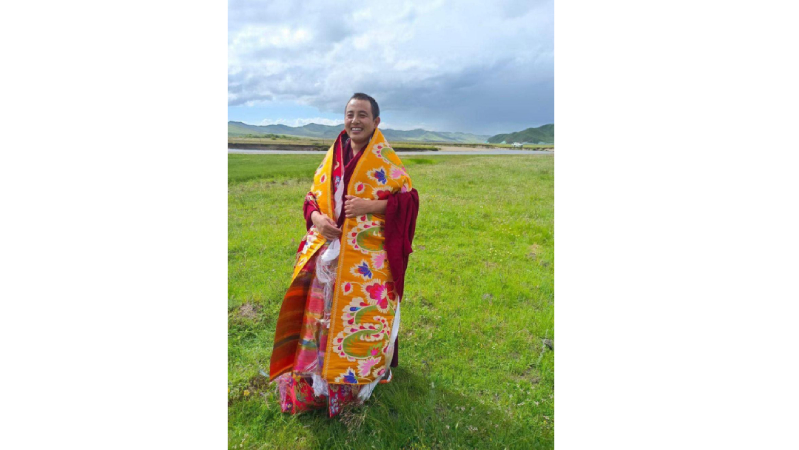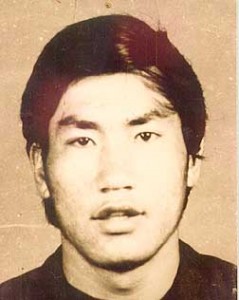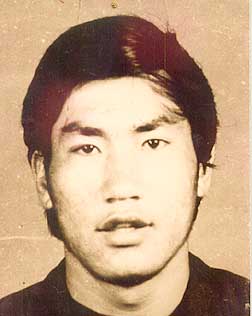Lobsang Tenzin, now 32, was released recently after serving 10 of the 13-year prison term in Ngaba (Chinese: Aba) Tibetan and Qiang Autonomous Prefecture in Sichuan Province, in the Tibetan province of Amdo. The exact date of his release is unknown.


Lobsang Tenzin, now 32, was released recently after serving 10 of the 13-year prison term in Ngaba (Chinese: Aba) Tibetan and Qiang Autonomous Prefecture in Sichuan Province, in the Tibetan province of Amdo. The exact date of his release is unknown.
Almost a month after his release from prison on 24 April 2013, Lobsang Tenzin was finally allowed to see his extended family members and relatives. However, he still remains under house arrest and constant police supervision. He cannot meet non-family members and may only leave his house to go to the hospital with a police escort.
Lobsang Tenzin spent half of his life in Chinese prisons before his release. After initially being sentenced to death Lobsang Tenzin’s sentence was eventually reduced to 18 years in addition to the six he already served.

Tibet’s longest-serving known political prisoner, Lobsang Tenzin, was released last month after completing his 18-yr term in Chushul Prison in the outskirts of the Tibetan capital, Lhasa, in Tibet Autonomous Region.
Lobsang Tenzin was the longest-serving political prisoner among a new generation of Tibetans born after the 10 March Tibetan uprising in 1959. Lobsang Tenzin was arrested on 5 March 1988 during a demonstration against Chinese rule in Lhasa. He was then about 24 and a student of Tibet University (Lhasa).
According to additional information received by the Tibetan Centre for Human Rights and Democracy (TCHRD) from reliable sources regarding the protest demonstration by 15 Tibetans in Lithang County yesterday, Sonam Tenpa, 29 years old and Lobsang Tenzin, 23, in particularly sustained severe injuries from the brutal beating at the site of the demonstration and the whereabouts of Gelek Kunga, still remains unknown.
Over the years, the Chinese authorities in Tibet have been appointing their officials in the monastic institutions to monitor and control the activities of the monks.
Lobsang Tenzin and Thupten Nyima, recently arrived in Nepal in early March, described to TCHRD the control and interference by government officials in their monastery.
They told TCHRD, “In Lhasa Ramoche Monastery, two officials have been permanently residing in the monastery under instructions from the Lhasa Religious Bureau. Although the monks of the monastery elect their heads, they have no control of the activities of the monastery. The government appointed officials call meetings in the monastery and conduct “love your religion, love your country” political education sessions in the monastery.”
In June 2003 there was news of five Tibetans arrested from the Tibet University in Lhasa. Dawa Tashi, one of the students arrested at the time reached Dharamsala and testified to TCHRD his personal accounts of the events that took place during the time.
According to Dawa Tashi, on 9 June 2003, civil clothed Lhasa Public Security Bureau (PSB) officials came to the university campus and ransacked the students living quarters and found a letter addressed to the United Nations and other political literary writings. Five students including himself were immediately arrested and subsequently detained in Tibet Autonomous Region (“TAR”) PSB Detention Centre.
The five had clandestinely written political essays and formed a secret organisation called “Democratic Youth Group of the Snowland”.

Lobsang Tenzin, a former student of Tibet University, is also in Powo Tramo. He was arrested on 19 March 1988 having been implicated as the “principal culprit” in the death of a People’s Armed Police officer during the independence demonstrations in Lhasa on 5 March 1988. Lobsang was first given a death sentence but due to strong international pressure this…